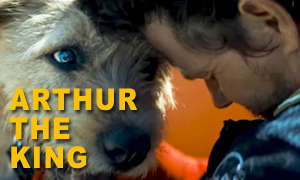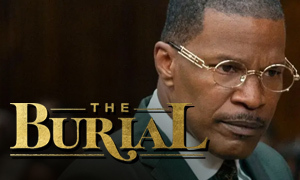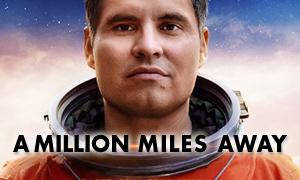Sound of Freedom: History vs. Hollywood
Jim Caviezel
Born: September 26, 1968
Birthplace:
Mount Vernon, Washington, USA
Tim Ballard
Birthplace: Los Angeles, California, USA
Mira Sorvino
Born: September 28, 1967
Birthplace:
New York City, New York, USA
Katherine Ballard
Born: May 1
Birthplace: USA
Did the real Tim Ballard grow frustrated after spending years stopping the end users of child pornography but never rescuing the kids?
Yes. The Sound of Freedom true story reveals that Tim Ballard, who had initially worked for the CIA for a year prior to joining the then-newly-formed Department of Homeland Security, spent several years busting the consumers of child exploitation material without ever being able to rescue the kids being exploited.
"I had spent 12 years as a Special Agent, undercover operator, for the Department of Homeland Security," says Tim Ballard, "working child crimes, child trafficking, and it was kind of an evolution, the first few years it was mostly just end-user, collector, cases of people who are possessing, distributing child exploitation material. And [I was] always wondering, 'Where are the kids?' I see these videos, it breaks my heart, I gotta describe them [in the reports]. There's a scene in the movie that breaks my heart where Jim [Caviezel] is crying as he's having to describe these horrific sex scenes of children, and when I say children, I mean average age, seven, six, five."
Tim said that the laws changed for the better in 2006. "For the first time, U.S. agents could actually go overseas and prosecute Americans for engaging in sex with children overseas, and prosecute them as if they'd committed the crime on U.S. soil. So that opened up my horizons and I started finding the kids." Tim said that despite it being a step forward, it could still be a frustrating process because the law didn't stipulate how much time, flexibility, or creativity he would be given when conducting an overseas mission, and even if he found the kids, he would be told to come home if he couldn't find the American citizen who was connected to their exploitation. -The Daily Signal
After being ordered to abort his mission in Colombia, did Tim Ballard quit his job so that he could stay and rescue the children?
While conducting our Sound of Freedom fact-check, we discovered that the movie's depiction of Tim Ballard quitting his job is largely accurate. Ballard says that everything came to a head for him in 2012 when he was working on two different cases, one in Haiti and one in Colombia (due to it being a two-hour movie, the case in Colombia is the only one focused on in the film). "I was told, 'Come home,' on both of them," says Ballard. "They were both major cases, a significant hit against human traffickers would have taken place. ... There I am, thinking, 'They're asking me to come home once again, and I'm not gonna do it. I'm gonna stay, and that means I have to quit my job." -The Daily Signal
Was Tim Ballard's wife okay with him quitting his job in order to rescue the children and complete his mission in Colombia?
Yes, but in answering the question, "How accurate is Sound of Freedom?" we learned that Tim Ballard's wife's discussion on the phone with him was a little different than in the movie. After being once again told by Homeland Security to abandon his missions and return home, Ballard got fed up and made the risky decision to quit his job in order to complete his operations and save the children. As stated earlier, he was working on two operations at the time, one in Haiti and one in Colombia (the movie only focuses on the latter). He told The Daily Signal that he called his wife, Katherine Ballard, and part of him hoped that she would tell him to come home, explaining that he was less brave at the time than the movie portrays him to be:
I called my wife, hoping, hoping she'll say, 'Get your butt home, are you kidding me? We got six kids to feed.' And I want her to say [that], because I was being a coward, but I knew it was the right thing, and she didn't, she didn't, she didn't read my script, and she said, 'Of course you're gonna stay,' and I said, 'Are you kidding me?'
In the film, you see [Mira Sorvino's character] say to me on the phone, 'You quit your job and rescue those kids.' What [my wife] really said to me, 'cause they didn't want to make me look like the coward that I was, because I was like, 'I'm coming home. I'm not gonna do this. I'm not gonna be part of this,' and she said to me, very sternly, 'I will not let you jeopardize my salvation by not doing this.' And it breaks my heart because not only is she losing our income, but she possibly, there's a very good chance, maybe 50-50, she's gonna lose me.
When Tim Ballard quit his job as a Special Agent with DHS, he and his wife Katherine Ballard had six children. Currently, at the time of the movie's release in 2023, Tim and Katherine have nine children, including two children they adopted who Tim helped rescue from traffickers. Tim and Katherine met while they were both attending Brigham Young University in Provo, Utah.
Who funded Tim Ballard so that he could quit his job and carry out the rescue operation in Colombia?
While analyzing the Sound of Freedom fact vs. fiction, we learned that it was media personality Glenn Beck who pulled together the funding for Tim Ballard and his team to complete the operations. "Glenn Beck, bless his heart, raised the money for us so that we could even do the operations," says Ballard. "I had no money to do it" (The Daily Signal). During an interview with Angel Studios CEO Neal Harmon, Ballard said that Glenn Beck started to help him raise money as he was in the process of leaving his job as a Special Agent with the Department of Homeland Security. He said that Beck was even in the original script for the film, but the scene was cut in order to fit everything in. -The Daily Signal
Are the villains in Sound of Freedom based on real people?
While discussing Sound of Freedom's historical accuracy, Tim Ballard said, "Every bad guy is real. In fact, the movie was cut because it got too long. They had cards at the end, telling you every bad guy's real, every kid is real, and it told you where they are today. They had to cut it. It hurt, but..." -The Victory Channel
Manny Perez's character Fuego, who Tim Ballard (Jim Caviezel) negotiates with in the movie, is a real person who was arrested during Operation Triple Take. Fuego liked to wear a hat similar to that of Marxist revolutionary Che Guevara. -O.U.R.
Is the movie's story of a woman posing as a talent recruiter and convincing a Honduran father to drop his daughter and son off at talent tryouts based in reality?
For the most part, yes. In the Sound of Freedom movie, a lower-middle-class Honduran father is approached by a well-dressed woman posing as a talent recruiter who overhears his daughter singing at the market. The woman, who is named Giselle, convinces the father to drop his daughter and son off at singing tryouts to see if his daughter can qualify for a young celebrity program. The father arrives with his two children at what appears to be an apartment filled with other children trying out for the program. The woman tells the father to come back at 7 p.m. However, when he returns, he discovers a dark, empty room with no sign of his children.
In the real story, there was a former beauty queen who allegedly helped lure in the children. Her name was Kelly Johana Suarez and she had been known as "Miss Cartagena." She was one of the five traffickers arrested on the island. Tim Ballard said that, similar to the film, they would lure in the children by pretending to have a modeling agency. -CBS News
According to Tim Ballard, how much of Sound of Freedom is based on the true story?
"So, they play with some times, they bring a couple of things together that didn't happen that fast, of course," says the real Tim Ballard. "Some things are definitely overreported. [Jim Caviezel] makes me look way cooler than I am. I promise. But some things are underreported, like we didn't rescue 54 kids on that island operation. We rescued over 120, and there's a documentary coming out called Triple Take, which tells everything that happened on that island." -The Victory Channel
Is Bill Camp's character, Vampiro, based on a real person who helped Tim Ballard?
Yes. In real life, Vampiro was also known as "Batman." The details of his backstory in the movie are mostly accurate. However, unlike what is stated in the film, he has never been to prison. The movie also states that he joined the fight against child trafficking after he slept with a prostitute and then realized it was a 14-year-old girl, which nearly drove him to suicide. In real life, Vampiro slept with an adult trafficking victim. He discovered that her young daughter was being exploited when she wasn't around, which is what motivated him to join the battle against child trafficking. Vampiro did help with Operation Triple Take, but he did not participate in the island operation that is depicted in the movie. He was leading another leg of that operation in Medellín, Colombia that was unfolding on the same day. -O.U.R.
How many women and children did Tim Ballard rescue during the operation depicted in the movie?
The real Tim Ballard says that his team rescued 123 trafficking victims in Operation Triple Take in Colombia. 55 of them were minors. "The film only gets into a piece of it," says Ballard. "There's 54 rescued on that island [depicted in the movie], but the op was bigger than that. The movie didn't have time to get into it." He says that there's so much more attached to the whole story. -The Daily Signal
In real life, the operation unfolded in three cities in Colombia over a one-hour time period in October 2014. When 25 Colombian special operatives raided the party on the island depicted in the movie, they arrested five suspects, four men and one former beauty queen. Of the 54 victims rescued on the island, 29 of them were under 18. The movie fictionalizes this a little by depicting all of the survivors rescued on the island as minors. -CBS News
Did Tim Ballard have a gun put to his head on the island after he tried to stop a man who walked off with a girl?
No. The harrowing moment in the movie where Jim Caviezel's character is on the island and intervenes to stop a man from walking off with a girl and harming her is fictional. On an episode of the Timcast IRL podcast, Ballard said that in real life, they make sure those types of situations never happen. "What you have to do is ahead of time set it up so you don't find yourself in those situations. In full transparency, that scene was fictionalized," Ballard revealed. "We plan out ahead of time to where on that operation and others like that we would never let them be in the same space. ... We'll separate them, so those kinds of things never actually have to happen." Ballard said that on one mission, they put a yacht out off the coast and used the money to lure the traffickers onto the yacht so they would be far away from the children.
Does Sound of Freedom show the exploitation of children?
No. "I demanded they didn't," says the real Tim Ballard, who insisted that such terrible crimes not be shown in the movie. The horror is instead conveyed in part through actor Jim Caviezel's eyes and expressions as his character reacts to the exploitation. -The Daily Signal
Has Tim Ballard ever killed anyone?
No. Near the conclusion of the movie, Jim Caviezel's character kills a man in order to rescue a child. This never happened in real life. In addressing this scene, Operation Underground Railroad's website clarifies, "Tim Ballard has never killed anyone, contrary to what is depicted in the film." The organization emphasizes that they do not act as a vigilante group. Instead, they work with governments and local authorities, contributing intel, funds, equipment and undercover operatives.
Did Tim Ballard go into the jungle by himself to rescue a little girl?
No. After Operation Triple Take concludes in the Sound of Freedom movie, Tim (Jim Caviezel) poses as a doctor and goes into a Colombian jungle by himself to try and rescue the little boy's sister, who is still missing. While the real-life little boy did have a sister, Tim's jungle search in the movie was instead very loosely inspired by his organization's real-life search for a little boy named Gardy, who had been kidnapped from the grounds of his father's church. At one point, several years after Operation Triple Take, Tim led a team of O.U.R. operators, pretending to be doctors, into a jungle on the border of the Dominican Republic and Haiti to look for Gardy. They were unable to find him, but they did give medical care to a number of ailing children. To this day, Tim wears a bracelet with the boy's name on it to symbolize the ongoing search for Gardy.
In an episode of his podcast, Tim commented on the movie and the filmmakers' decision to include the fictional jungle rescue, "Some things of course are exaggerated. They take liberties as they do, and I've always told them, 'If you take liberties, you can, but I'm not gonna pretend. If you make me look way more amazing than what I am or what I did, I'm gonna be honest about it.'"
How many children are trafficked each year?
While researching the Sound of Freedom true story, we learned that according to the National Center for Missing and Exploited Children, approximately 350,000 children are reported missing every year in the United States. Of that total, an estimated 100,000 are being trafficked. The 2021 Federal Human Trafficking Report stated that 57% of U.S. human trafficking victims were minors.
As stated at the end of the movie, human trafficking is a 150 billion-dollar-a-year criminal enterprise. It has eclipsed the illegal arms trade and is roughly a third of the size of the drug trade. American citizens are often the ones traveling to other countries to exploit children.
The child trafficking statistics graphic below is free to share (no attribution necessary).
Is America's current border situation making it easier for children to be trafficked and exploited?
Yes. "This film, the story kicks off at the port of entry at the southern border. That's a true story," says Tim Ballard. "They filmed that exactly where that happened with that little boy and the necklace, that's a real story, the necklace with Timothy on it. That's timely. Look what's happening right now on our southern border." Ballard says that he spent 10 years working at the border as a Special Agent with the Department of Homeland Security. -The Victory Channel
In an interview with The Daily Signal, Ballard explained how the current lack of security at the border is exacerbating the problem of child trafficking:
The economy of pedophilia. The United States is the number one consumer of child exploitation material. We are the demand. So, that means that traffickers want to get children into that dark market. There's a lot of money to be made here. The United States, also according to the State Department, is in the top three countries for destination countries for human trafficking. So, there's every incentive to get children into America, into the black markets here of pedophilia.
And so, when I find out that in the last couple of years that at least 85,000 — I think it's much higher than that — that at least 85,000 unaccompanied minors [have shown up at the border], thousands of them, I've seen the CBP reports, are under five years old. Why is a three-year-old showing up at the border? Well, I can tell you why, because they show up with a name, the name of the sponsor that they're given by the trafficker. HHS gets the kids and they by law have to call the number.
*pretends to pick up phone*
'Hi, we have Jose Gonzalez, Mr. George Smith.'
'Yeah, yeah, that's my kid, whatever.'
They used to actually fly down and have to pick the kid up. Not anymore. Our taxpayer dollars will [now] send the kid by plane or bus to this 'sponsor', no background check, no DNA, nothing. And they deliver the kids. Our taxpayer dollars are literally, for the first time in American history, our taxpayer dollars are going to facilitate the last leg of a child trafficking event.
Ballard says that the only compassionate border policy is border enforcement, including barriers and walls, because, as emphasized in Sound of Freedom, "the walls and the barriers lead the children who are being hurt into that funnel of rescue. Trained women and men in uniform are there. Those kids want to go through the port of entry. Those kids pray for a wall. The wall will save their lives! But let's take it all down. Let's open it all up. Kids are being abused by the thousands and our taxpayer dollars are actually funding it."
Who did Tim Ballard want to play him in Sound of Freedom?
During our Sound of Freedom fact-check, we learned that it was Tim Ballard who requested that Jim Caviezel portray him in the film, despite Caviezel being much taller and with dark hair. Their physical differences aside, Ballard wanted Caviezel for more personal reasons. "I don't trust Hollywood," said Ballard, "but I know one thing about Jim Caviezel. One, he's a great actor. My favorite movie of all time was The Count of Monte Cristo. And I know he loves Jesus, and that is important to me, someone who loves the Lord. I can at least trust in that." -Angel Studios
Did movie studios shy away from wanting to release Sound of Freedom?
Yes. It was a long journey and a struggle for the filmmakers to get the movie made and released. Actor Jim Caviezel spoke about the challenges during several different interviews for the film:
We struggled making it. We struggled gettin' the money together. We lost our money. We lost our studios that were supporting us, and yet we were just getting by, a little bit at a time. Faith bonded us together. Once we got it done, Eduardo Verástegui (Bella) had to bear the burden and try to get this film [released], and studio after studio, it's like nobody would want it. ... We had the same issue with The Passion of the Christ, and that thing ended up becoming a juggernaut. -The Daily Signal
When it went to the studios, you clearly see people getting up and crying and weeping, and moved to tears, and laughed and highly entertained, and then when it was all said and done, it was, 'Sorry, this isn't for us.' -Q&A with Jim Caviezel and Neal Harmon
20th Century Fox produced Sound of Freedom and Disney owned it after they purchased 20th Century Fox. However, Disney decided to shelve the film. After pulling together funds and negotiating, Angel Studios, the company behind the hit series The Chosen starring Jonathan Roumie, picked up the movie.
How did actor Jim Caviezel prepare for the role of Tim Ballard?
While dissecting the Sound of Freedom fact vs. fiction, we discovered that in order to prepare for the role, Caviezel said that he spent time training with Ballard, specifically in close-quarter combat. He was even able to accompany Ballard on missions. "I go and literally sit in on these missions," says Caviezel, "and I'm watching him and his analysis of what he sees. And it has to be done very methodically. And I'm trying to find out who he is and what I am and how we're similar." -National Catholic Register
Did Jim Caviezel lose his agents over the movie?
Yes. In an interview with Angel Studios CEO Neal Harmon, Caviezel said that, as with The Passion of the Christ, he and the filmmakers have endured blowback for making Sound of Freedom:
I want this to be so huge that they're forced to look at this. I lost my agents over this. Yep, 17 years, 15 years. I lost my lawyer over this, and now I understand why all these actors didn't want to do the movie because of this. Listen, you do Schindler's List fifty years later, you're a hero. Try doing Schindler's List when the real Nazis are right there. Understand how that becomes more dangerous? I don't understand why people are willing to let children be hurt, but in this time, Hollywood says, 'No, no, let's kick that down fifty years from now and then [see where we're at]. That's crap.
Did Tim Ballard start an organization to fight human trafficking?
Yes. The Sound of Freedom true story confirms that in 2013, former Department of Homeland Security Special Agent Tim Ballard founded Operation Underground Railroad (O.U.R.), a nonprofit organization that rescues children from sex trafficking and sexual exploitation. His team includes many former government operatives who gave up their careers to focus on rescuing children, in part because the U.S. government has not made fighting child trafficking a priority. According to the O.U.R. website, the team can work in any jurisdiction and alongside law enforcement to rescue children directly. They have reportedly been involved in more than 4,000 operations and 6,500 arrests since their inception (FOX News). Ballard says that they've extracted over 6,000 women and children, who they've helped get into recovery (Lewis Howes).
Tim Ballard says that he would never have been able to quit his job with the government and start O.U.R. without the support of his wife, Katherine Ballard, with whom he shared six children at the time (they currently have nine). As Tim was tempted to make the easy decision and remain at his cushy DHS job and not give up his pension, Katherine encouraged him and offered him spiritual guidance, telling him that even if they lost their house, rescuing the children was more important and would be the path that would not jeopardize their salvation.
Link-to-Learn More:







